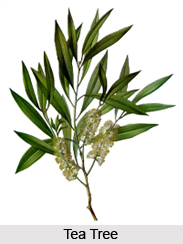 Tea- tree oil is known for its current sterile and anti-fungal treatment or infection-reducing benefits. It also has antibiotic properties. It helps as an aid against aliments such as skin infections, rashes, burns and dandruff.
Tea- tree oil is known for its current sterile and anti-fungal treatment or infection-reducing benefits. It also has antibiotic properties. It helps as an aid against aliments such as skin infections, rashes, burns and dandruff.
It is a small tree from New South Wales in Australia, similar to Cypress, with needle-like leaves and heads of sessile yellow or purplish flowers. This is one of the most commonly used essential oils, it has a long history of use in holistic care, especially as an anti-fungal agent. It is excellent for skin conditions including insect bite and eczema; in addition it has strong anti-viral properties useful for colds and sore throats, as inhalations and gargles.
It is one of the most powerful immune system stimulants and sorts out most viral, bacterial and fungal infections in a snap, while it is great to clean wounds and also relieves muscle aches and pains. Tea tree oil is cooling and moisturizing, which also acts as fungicidal, vulnerary, antiseptic, anti-infection, expectorant, stimulant, antiviral, antibacterial and antipyretic. This oil mixes well with the following oils: Lavender, Clove, Rosemary,
Geranium, Neroli, Trifolia, Chamomile, Eucalyptus and Niaouli.
 Uses of Tea Tree Oil
Uses of Tea Tree Oil
•Tea tree Oil acts as an immuno-stimulant and increases the body`s ability to fight off any infections.
•It can ward off the infections of three types of germs namely bacteria, fungi and viruses.
•It can help with influenza, cold sores, catarrh, glandular fever and gingivitis.
•A course of massage with tea tree oil before an operation may help to fortify the body and reduce post-operative shock.
•It is also most effective to help clear bronchial congestion, asthma, coughs, sinusitis, whooping cough and tuberculosis.
•On the genito-urinary system, it can be used to help clear vaginal thrush, cystitis and genital infections in general.
Historically, the tea leaves were used as a substitute for tea, which is how tea tree oil got its name. The part used medicinally is the oil from the leaves. Tea tree oil contains the herbal and chemical constituents called terpenoids. The tea tree oil has been found to have antiseptic and antifungal activity. The compound terpinen-4-ol is the most abundant and is thought to be responsible for most of antimicrobial activity of tea oil.




